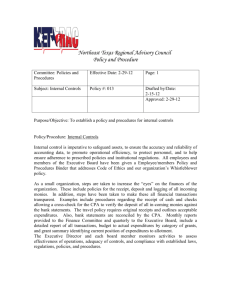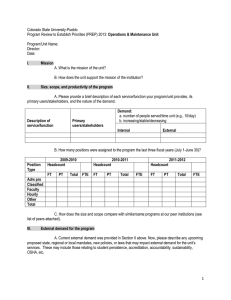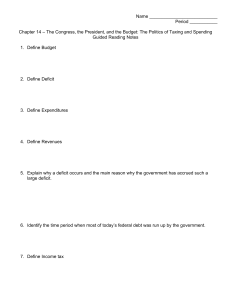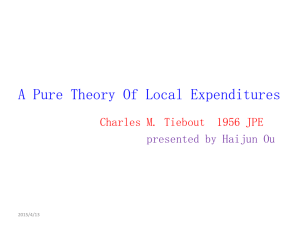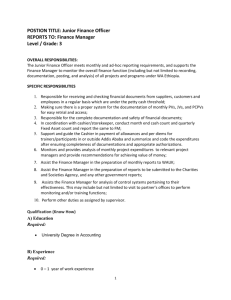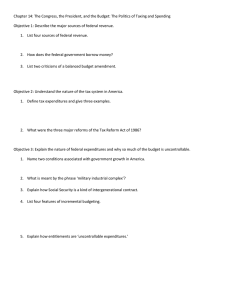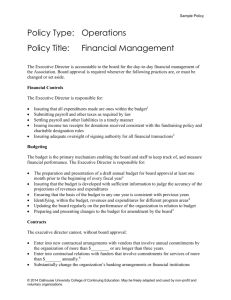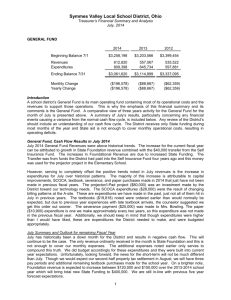The Economic Impact of a University on its Community and State
advertisement
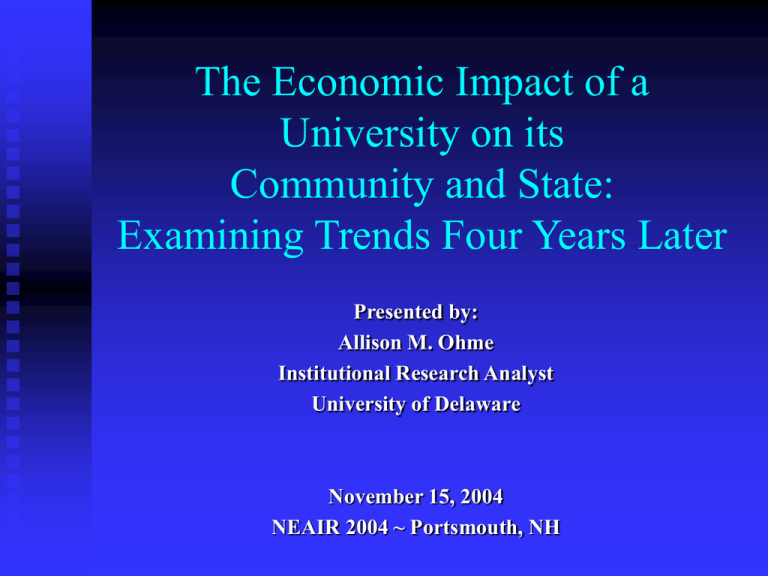
The Economic Impact of a University on its Community and State: Examining Trends Four Years Later Presented by: Allison M. Ohme Institutional Research Analyst University of Delaware November 15, 2004 NEAIR 2004 ~ Portsmouth, NH Session Outline What is an Economic Impact Study? Background 1999 University of Delaware (UD) Economic Impact Study Methodology – Replicated for 2003 Study to examine trends Highlights of Findings Challenges and Benefits Questions and Comments 2 What is an Economic Impact Study? Effects on the Labor Market Creation of new knowledge Expenditures in the Local Economy Direct purchases to local merchants Conducting pure & applied research Development of new technologies & industries Indirect purchases stimulating local economy (Stokes & Coomes, 1998) 3 Background UD’s 1999 Economic Impact Study Survey Student Expenditures Faculty and Staff Expenditures Local Business – affected by UD? University Expenditures Use of Multiplier to estimate induced (indirect) economic impact – OVERALL IMPACT 4 What does the overall economic impact actually mean? Student Expenditures Faculty & Staff Expenditures Apply Multiplier to direct expenditures University Expenditures OVERALL IMPACT - Estimates overall impact by accounting for the subsequent purchases made by merchants due to the profits from revenue of the direct purchases. 5 Methodology -Student Survey 6 Methodology - cont. -Faculty/Staff Survey 7 Methodology - cont. -Business Survey Number of students and alumni employed Approximate percentage of business income attributed from the sales of products and services to the University of Delaware and its community Impact on business if student enrollment at the University of Delaware declined Ways the University of Delaware and its community influence business decisions 8 Methodology - cont. -Sample and Response Rates Students Faculty & Staff Businesses Sample Responses Response Rate 2580 1935 327 618 781 99 24.2 40.4 32.7 Student data set weighted to correctly represent overall student population by gender, time states, class level, residence status, and on/off campus status. Faculty/Staff data set weighted to represent faculty and staff population by employment and time status. 9 Highlights of Findings -Student Income Mean monthly student income from all sources after taxes: 2003 - $1,380 **Increase of 35% 1999 - $1,020 10 Students – Mean Monthly Expenditures Mean Monthly Expenditures Spent in Delaware by Overall Student Respondents 1999 2003 Housing Utilities Telephone and Cable Food and Beverage Entertainment and Recreation Services Clothing Books and Educational Supplies Other Retail Automobile Medical and Dental Other - 1 Other - 2 Other - 3 Total Mean Monthly Expenditures $ 244 39 37 126 43 27 44 38 45 114 14 9 3 1 782 $ 271 38 41 139 46 30 39 105 42 114 49 61 88 0 1,063 Percent Change 11 (3) 11 10 7 11 (11) 176 (7) 0 250 578 2833 (100) 36 11 Students – Full Time v. Part Time Total Mean Monthly Student Expenditures Spent in Delaware by Time Status 3,000 Dollars ($) 2,500 2,000 1999 2003 1,500 1,000 500 0 Full-Time Part-Time Time Status 12 Students – Overall Annual Expenditures Annual Expenditures Spent in Delaware by Overall University Student Population Housing Utilities Telephone and Cable Food and Beverage Entertainment and Recreation Services Clothing Books and Educational Supplies Other Retail Automobile Medical and Dental Other - 1 Other - 2 Other - 3 Total Annual Expenditures 1999 2003 Expenditures Expenditures Per Year ($) Per Year ($) * 44,506,332 49,547,608 7,113,717 6,947,635 6,748,911 7,496,133 22,982,778 25,413,718 7,843,329 8,410,295 4,924,881 5,484,975 8,025,732 7,130,468 6,931,314 19,197,413 8,208,135 7,678,965 20,793,942 20,842,905 2,553,642 8,958,793 1,641,627 11,152,783 547,209 16,089,260 182,403 0 143,003,952 194,350,948 * Annual Calculation – see next slide Percent Change 11 (2) 11 11 7 11 (11) 177 (6) 0 251 579 2840 (100) 36 13 Student Overall Annual Expenditures - Calculations The annual expenditures for each student category were calculated by multiplying the mean monthly expenditure by the student headcount for each term by the number of months in each term. Mean Monthly Expenditure for each Category X # of Months in each Term = Annual Exp. for each Category The terms (number of months) included: X Student Headcount for each Term fall 2003 (4 months) winter 2004 (1 month) spring 2004 (4 months) summer 1 and 2 2003 (1.5 months each) The total annual expenditures were the sum of each category’s above calculations. 14 Highlights of Findings -Faculty & Staff Mean Monthly Expenditures Mean Monthly Expenditures Spent in Delaware by Overall Faculty and Staff Respondents Housing Utilities Telephone and Cable Food and Beverage Automobile Medical and Dental Services Clothing Other Retail Entertainment and Recreation Education and Tuition Other - 1 Other - 2 Other - 3 Total Mean Monthly Expenditures 1999 2003 $ 690 149 74 374 308 84 92 91 90 66 178 92 32 1 2,323 $ 767 160 89 392 375 99 116 89 119 70 145 153 114 40 2,728 Percent Change 11 7 20 5 22 18 26 (2) 32 6 (19) 66 256 3900 17 15 Faculty & Staff – Overall Annual Expenditures Annual Expenditures Spent in Delaware by Overall University Faculty and Staff Population Housing Utilities Telephone and Cable Food and Beverage Automobile Medical and Dental Services Clothing Other Retail Entertainment and Recreation Education and Tuition Other - 1 Other - 2 Other - 3 Total Annual Expenditures 1999 2003 Expenditures Per Expenditures Year ($) Per Year ($) * 28,094,040 33,511,764 6,066,684 6,990,720 3,012,984 3,888,588 15,227,784 17,127,264 12,540,528 16,384,500 3,420,144 4,325,508 3,745,872 5,068,272 3,705,156 3,888,588 3,664,440 5,199,348 2,687,256 3,058,440 7,247,448 6,335,340 3,745,872 6,684,876 1,302,912 4,980,888 40,716 1,747,680 94,501,836 119,191,776 * Annual Calculation – see next slide Percent Change 19 15 29 12 31 26 35 5 42 14 (13) 78 282 4192 26 16 Faculty & Staff Overall Annual Expenditures - Calculations The annual expenditures for each faculty/staff category were calculated by multiplying the mean monthly expenditure by the employee headcount by 12 months. Mean Monthly Expenditure for each Category X Employee Headcount X 12 Months = Annual Exp. For each Category The total annual expenditures were the sum of each category’s above calculations. 17 Highlights of Findings -Business Responses 38% of the business respondents employed 1 to 4 current University of Delaware students and almost half (49%) employed 1 to 4 University of Delaware alumni. 26% of the business respondents indicated that for the part of their company that is located in the Newark area, 26 to 49% of their business income could be attributed to the University and its community. Businesses buy products, schedule sales and promotions around University clientele. 18 University Economic Impact Additional data collected from UD administration: University Purchasing Conferences and Events UD’s in-state purchasing of products Local residents and services spending at UD Approx. $95 million events purchased from in Cash flow to UD in state vendors addition to Tuition 56% of total & Fees purchasing is within the state of Delaware 19 Overall Economic Impact Annual Expenditures Spent in Delaware by the University of Delaware and Its Community Estimated Spending in Percent Percent Overall Economic Delaware Per Year Change Change Impact (Gathered from since 1999 (Using Multiplier*) since 1999 Surveys and UD data) Student Expenditures 194,350,948 36 349,831,706 29 Faculty and Staff Expenditures 119,191,776 26 214,545,197 19 University Purchases 94,893,449 51 170,808,208 43 Total Economic Impact 408,436,173 36 735,185,111 29 Use Output Multiplier of 1.8 to calculate the Overall Economic Impact. This estimates the induced effects after the direct purchases are made to in-state vendors. * Regional Input-Output Modeling System (RIMS II). Regional Economic Analysis Division, Bureau of Economic Analysis, U.S. Department of Commerce, 2004. 20 More about the Multiplier * Output Multiplier Estimates the effect that UD’s spending has on the state in terms of direct and indirect purchases. * Regional Input-Output Modeling System (RIMS II). Regional Economic Analysis Division, Bureau of Economic Analysis, U.S. Department of Commerce, 2004. Employment Multiplier Number of jobs created by each additional $1 million of output. 20 jobs/$1 million 20 x 408.436 = direct output supports approx. 8,169 jobs 21 Economic Impact in Context These estimated expenditures are more than 4 times the state operating appropriations level ($100 million). The estimated total economic impact of the University of Delaware is approximately $735 million, nearly a 29% increase compared to the results in the 1999 study. 22 Challenges of an Economic Impact Study If done in-house: large data set, multiple mailings to gain response. Detailed and sometimes overwhelming survey. Location of the institution and commuters - the spending may either stay local to the institution, or occur where the students and employees live. Multipliers available for regions and states. Difficult to account for institution’s visitors. 23 Benefits of an Economic Impact Study Understand how students and employees spend money locally. Examine institutional impact on local businesses. Provide government and public officials with an estimate of the economic value an institution adds to the region/state. Create opportunity for institution to discuss local relationships and shared goals. 24 Questions or Comments?? 25 This presentation and the accompanying paper are located at: http://www.udel.edu/IR/presentations Thank you! Allison M. Ohme Institutional Research Analyst Office of Institutional Research & Planning University of Delaware 325 Hullihen Hall Newark, DE 19716 302-831-0239 aohme@udel.edu 26
